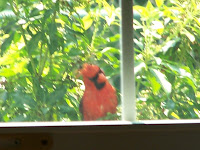
Thursday, December 16, 2010
Monday, December 13, 2010
Tuesday, December 7, 2010
Monday, December 6, 2010

 Four trees of red.
Four trees of red.
These trees are red--red poinsettia, green with red berry lights and red wooden toys, red and white tinsel with red lights and decorated with cookie and sweets ornaments, red tinsel with red lights decorated with walnut shell babies and candy ornaments. The color and the theme of childish delights tie the decorated trees together and yet each tree is unique.
Sunday, December 5, 2010

^^^^^^^^^^^^^
Tuesday, November 23, 2010
Monday, November 1, 2010

Monday, October 18, 2010

Monday, October 11, 2010
Tuesday, September 21, 2010

Wednesday, June 23, 2010
Sunday, June 13, 2010
Tuesday, May 25, 2010

Tuesday, May 18, 2010
Readers connect with interesting characters, not stereotypes. So what is the difference? Think of flat characters as first impressions that went no further. Interesting characters have desires, faults, and quirks. Like your friends they're not always easy to understand. They may contradict themselves and change their minds, but they remain who they are.
Writing means spending time getting to know your characters. It goes beyond character charts and outlines. No computer or pen is necessary. You need to listen for their voices, ask them questions, and have them play scenes out in your head. Oddly, characters can only tell you what they know. Once I had to ask a secondary character what secret was being kept from the main character. Another time a character had to undergo some therapy before I could understood why she did what she did.
And in answer to your unasked question--Yes, writers are little crazy.
Tuesday, May 4, 2010
 Writing needs courage. Despite the best outline (which mine are not) a story unfolds as it must. The author has to trust his characters and experience each scene as it comes while looking down from his outline and planned outcomes. Often it means plodding along, worrying, stalling for days, when all you want is to rush to the ending. But the insights that come from this process will make the book a worthwhile read.
Writing needs courage. Despite the best outline (which mine are not) a story unfolds as it must. The author has to trust his characters and experience each scene as it comes while looking down from his outline and planned outcomes. Often it means plodding along, worrying, stalling for days, when all you want is to rush to the ending. But the insights that come from this process will make the book a worthwhile read.Thursday, April 22, 2010

Monday, April 19, 2010
Tuesday, April 13, 2010


Flowers from Longwood Garden's Orchid show
Lesson for readers: Read the book! The book will add depth to your enjoyment of the story you saw on the screen.
Friday, April 9, 2010

Another View
A writer needs to know if his words are portraying the meaning he is trying to convey. That's why it is necessary to have readers who can tell you what they need in the book, including good grammar. But a writer should also critique other writers' work. It's amazing how easy it is to spot your writing difficulties in another person's work. Think of it as another way to view your work.
Monday, April 5, 2010

Thursday, April 1, 2010

Tuesday, March 23, 2010
Sunday, March 14, 2010
Thursday, March 4, 2010
Wednesday, March 3, 2010

Wednesday, February 17, 2010

Saturday, February 13, 2010

Thursday, February 11, 2010
Wednesday, February 10, 2010
writers
Monday, February 8, 2010
Wednesday, February 3, 2010
Monday, February 1, 2010
Sunday, January 31, 2010
Wednesday, January 27, 2010
 An autobiography is self-indulgent. Daphne du Maurier
An autobiography is self-indulgent. Daphne du MaurierWriting: Writers don't need to pen memoirs, their past and views are in their writing. No one needs to know the specifics of a writer's life--memories can fuzz those--it's honesty that readers deserve.
There's nothing to writing. All you do is sit down at a typewriter and open a vein. Walter Wellesey "Red" SmithTuesday, January 26, 2010
Monday, January 25, 2010
Sunday, January 24, 2010
Friday, January 22, 2010





























